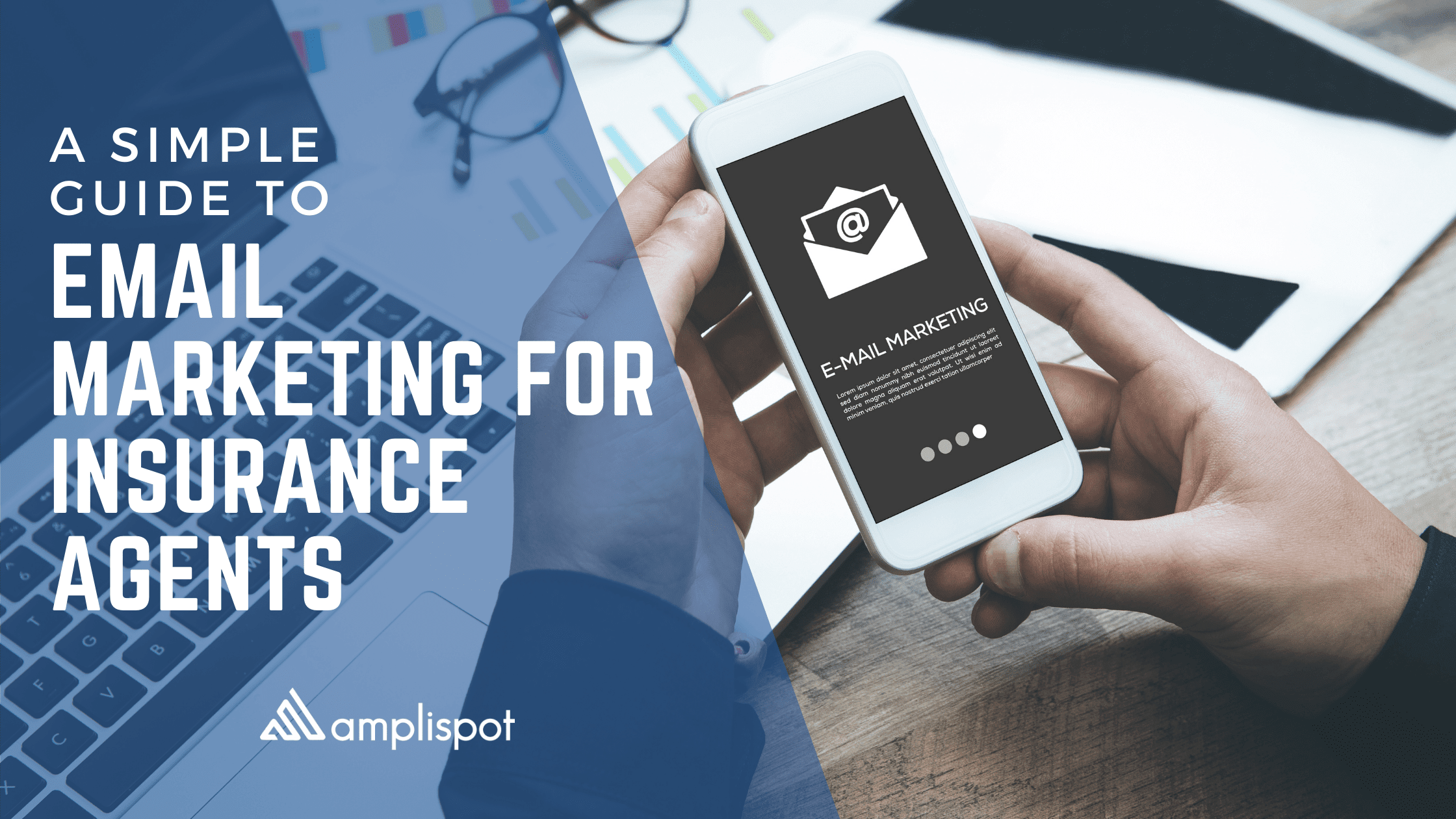Insurance companies concentrate on giving solutions to individuals and organizations when things are tough. That’s why email marketing is so important during good times. It provides insurance agents a fantastic chance to earn the confidence of existing clients and prospects, allowing them to know who they can call for advice if things go wrong.
It seems that everyone is utilizing email marketing these days, and most people have inboxes full of commercial emails. To stand out nowadays necessitates a plan, excellent writing abilities, and a personal touch to maintain open lines of communication.
We’ll walk you through the basics of goal-setting for your insurance email marketing campaigns, including what kinds of emails you can send and some insurance email marketing suggestions to create a personalized approach that’s right for your company.
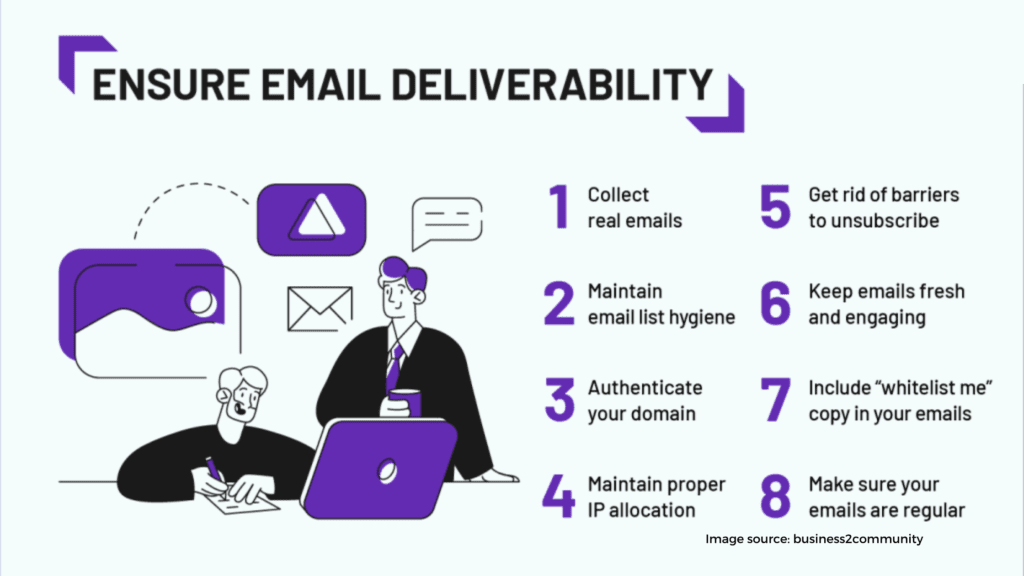
What is Email Marketing?
Email marketing is a component of digital marketing strategy. We can look at email marketing in the context of achieving the following objectives for the purposes of selling insurance:
- Raising awareness (lead generation)
- Engagement on social media channels
- Subscribing or following on social media
- A way to stay in touch
- Client conversion
Email marketing is one component of a complete marketing plan. It’s part of a whole marketing strategy that leads to the end goal of converting insurance leads into clients.
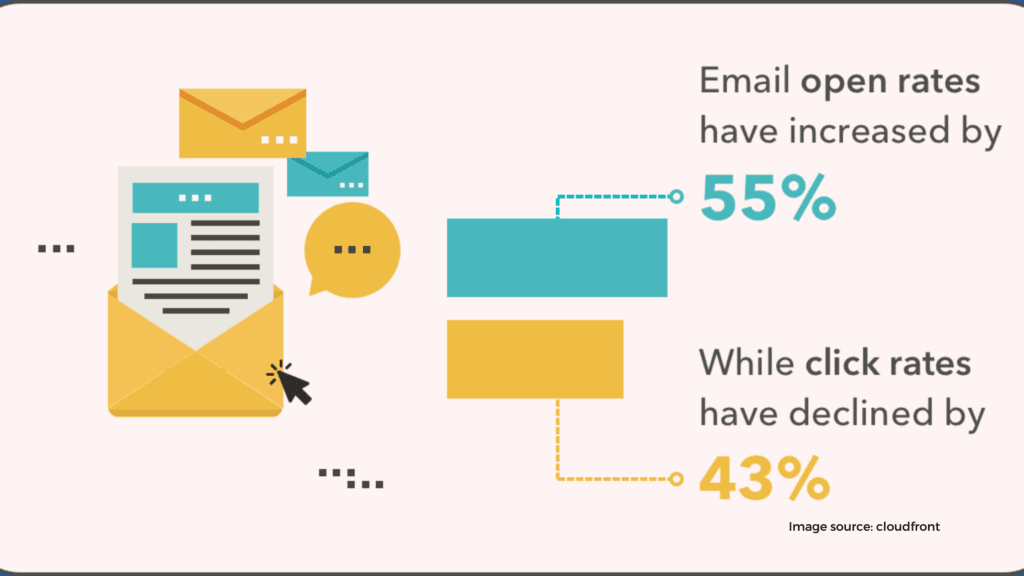
How Do You Know If You’re Doing It Correctly?
If you achieve your objectives with email marketing, you’ll be doing it right.
Different professionals have different objectives; however there are some that apply to virtually everyone. The following are some of the common goals:
- Generating leads
- Getting referrals from existing customers
- Upselling existing customers
- Retaining existing customers
Not All Email Marketing is Created Equal
There are two types of emails: good and bad. There is likewise a distinction between excellent and terrible email marketing. There are various sorts of emails with distinct goals. Here are a few of the many different kinds of emails that you may or may not be acquainted with:
Email Newsletters
The majority of people are familiar with email newsletters. They’re emails designed to deliver updates and offers. Some firms send out an email blast monthly, weekly, bi-weekly, or even daily. The frequency is determined by the sort of business and its approach.
An email newsletter, when done correctly, may develop into something your target audience anticipates. By having a service-oriented aim behind each publication, for example educating your readers, informing them of product updates, or simply amusing them.
Lead Nurturing Emails
When you’ve met a new lead online or offline but have yet to make a sale, use lead nurturing emails to entice the individual to learn more about your offerings by including personal experiences and anecdotes. This establishes interest and trust over time.
Welcome Emails
Welcome emails are sent after an insurance lead is converted into a new client. The following are some examples of material that you might include in your welcome series:
- Saying thank you
- Offering a gift, such as an exclusive video or ebook
- Sharing social media links
- Introducing them to your team
Transactional Emails
Transactional emails are communications about your services. They’re usually simple to comprehend and written in a formal tone, and they have a clear subject line and a call to action. Here are some examples:
- Invoices or receipts
- Requests to update personal information
- Event registrations
- Policy updates
- Appointment reminders, etc.
Other Automated/Triggered Emails
Other types of emails that you may use with your email marketing software include:
- Birthdays
- Renewals
- Anniversaries
- Holiday greetings
Cold Emails
Although people who are aware of you, your company, or the services you provide may be sent cold emails, some aren’t.
Spam is such a problem that it’s critical not to send out bulk marketing messages to people who haven’t granted you permission to do so, including adding emails you get from business cards to your email marketing list.
It’s also an unethical approach to use bots. It can have a negative impact on your online reputation.
It’s possible to send personalized one-to-one emails manually or with programs like HubSpot Sales Sequences and Apollo.io. Just be careful not to get your email account shut down unintentionally.
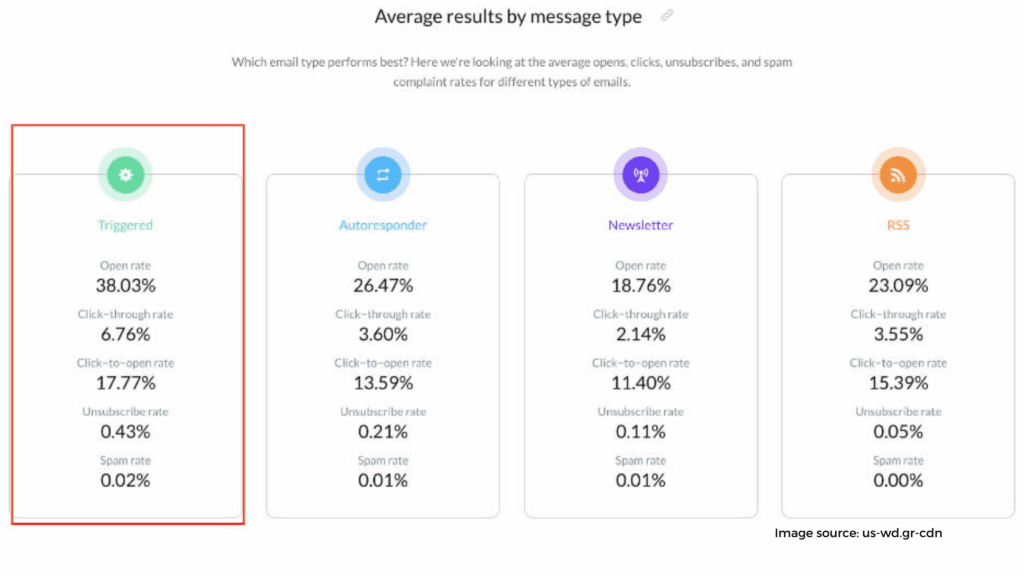
What Type of Email Marketing Should Your Insurance Agency Be Doing?
Your email marketing agency should be implementing all types of email marketing as part of a comprehensive digital marketing plan. It’s vital to start small and build on that foundation. Begin by implementing the most basic solution, such as a monthly email newsletter.
It’s vital to communicate this information in a timely manner. It’s also crucial to be consistent with email marketing. If you start a monthly newsletter, make sure your subscribers know it and stick to a schedule.
The remainder of the types of emails may be implemented one at a time using a Customer Relationship Management (CRM) program or email software.
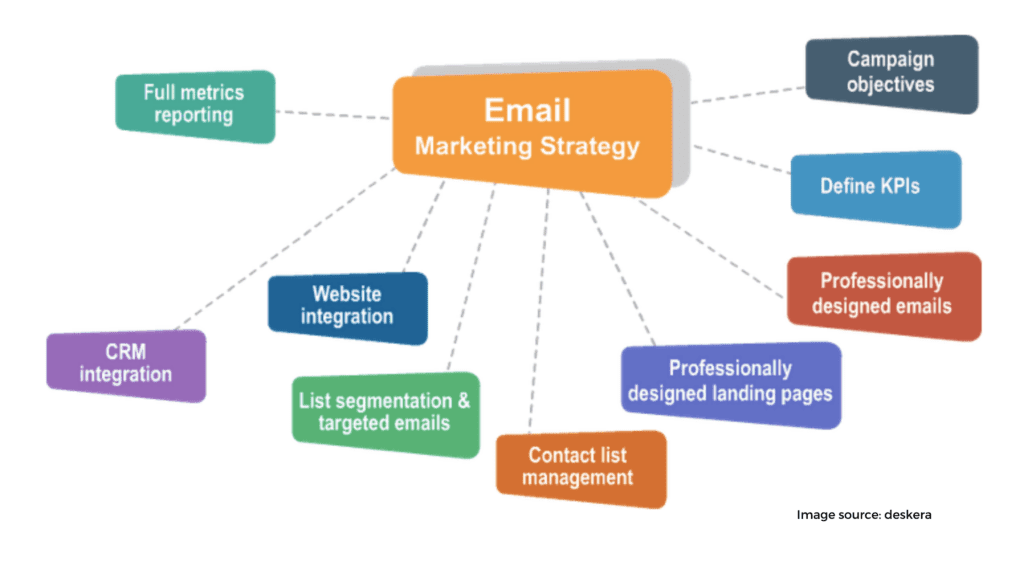
How to Build an Effective Email Marketing Strategy for Your Agency
Here are some basic stages for developing an email marketing plan for your firm. Any effective strategy will change as time goes on, so be willing to accept new concepts and adapt to current trends because digital marketing is always changing.
Start by building your database
The first step to creating an effective email strategy is to compile your email list. Here are some primary questions to kickstart the process:
- Where will you build your database?
- Will your marketing database be disconnected from your customer relationship management system?
- How will you share contacts among the two systems?
- Do you have emails of your existing customers?
- Does your website have a sign-up form?
The goal is to start small, especially if you’re beginning from scratch. Keep it effortless by adding email addresses to a spreadsheet while deciding on the software you’ll use.
The next step is to establish a process with your agency for collecting this information in the future.
Determine what software you will be using
Several software programs are available to assist you with your email marketing efforts. Here are some important questions to ask:
- What is your software budget? Is the software cost-effective?
- Who will use it? Which team member will be responsible?
- Will this new software integrate with the agency management system?
- Does the software work across all relevant marketing channels?
- Do you require a standalone email marketing solution or a more integrated marketing automation platform?
The last issue is quite crucial, and you may want assistance from your marketing team in making this choice. Another alternative is to hire a marketing agency to assist you with this procedure. This can be a fantastic return on investment for some small businesses.
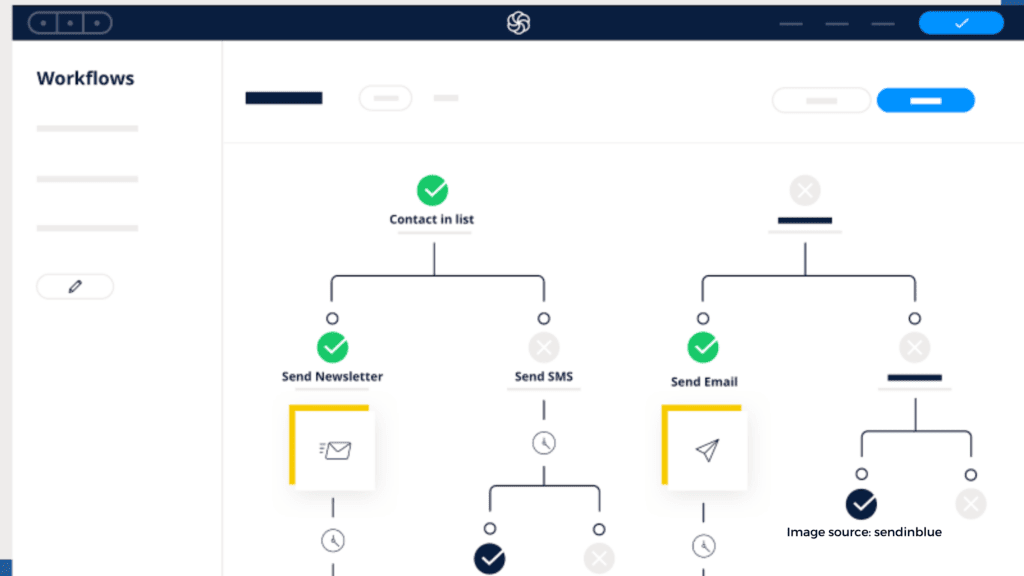
What is marketing automation?
These are email marketing platforms that you may use to add subscribers, segment them into lists, and send scheduled bulk emails by themselves. Many of these systems have grown to include integrations for automated/triggered emails and email drip tactics.
You’ll need a full-featured marketing automation system to send automated emails based on triggers like dates, website visits, or account changes.
What can you do with marketing automation software?
Marketing automation services that are full-featured, such as ActiveCampaign, HubSpot, and Pardot, can help you send emails and a lot more.
These platforms provide website services, blogging, text messaging, social media, and other online services in addition to fully automated email marketing. They allow you to manage all of your marketing activities from one location, allowing you to develop multi-channel digital marketing campaigns.
Set a goal and define your team
You’ll want to establish a goal once you’ve got your database up and running and have chosen your software. It’s advisable to start with a modest objective.
After setting the goal, here are a few questions to ask:
- How will we measure success?
- Who will be handling copywriting, designing, and scheduling emails?
- What is our timeline?
Get to work
Now that you’ve decided on how often your recipients will get new content, it’s time to start writing the emails. Make a timetable for the emails you’ll send out and a content calendar with all of the key information.
Set deadlines some days in advance of distributing so that you can delegate the writing, graphic design, and research to your team. It may be beneficial to engage a professional digital marketer who could help you fine-tune this procedure when you begin.
Measure, analyze, optimize & repeat
It might take time to achieve your goals. Email marketing software or programs should provide metrics such as the percentage of emails that are opened, time of day, how many people click on your links, and more.
Make a habit of learning with each email, and pay close attention to the data. An email marketing plan develops over time for both newcomers and veterans.
Conclusion
Email marketing is a fantastic method to connect with your audience, build awareness, develop trust, and improve your overall marketing approach. An email marketing plan will assist you in determining your objectives and showing you how to achieve them. It’s a fantastic chance to develop stronger connections with existing customers while attracting new prospects and converting them into clients if done correctly.

